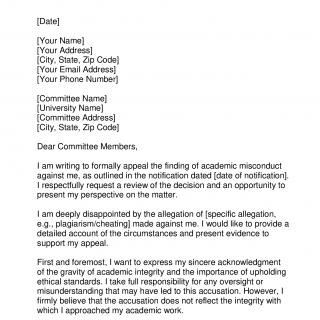Academic Misconduct Appeal Letter
The academic misconduct appeal letter is a crucial communication submitted by a student to challenge a finding of academic misconduct, such as plagiarism, cheating, or unethical behavior. Its primary purpose is to request a review of the misconduct decision and seek a fair resolution. This letter typically consists of several key parts, including a detailed explanation of the situation, arguments against the accusation, any necessary evidence or documentation, and a sincere acknowledgment of the mistake made.
When writing the academic misconduct appeal letter, it is important to consider the main parties involved, including the student writing the letter and the relevant academic or disciplinary committee responsible for reviewing the appeal. The letter should be presented in a professional, respectful, and well-organized manner, highlighting the student's perspective and providing compelling arguments against the accusation of misconduct.
Key data required when writing the letter may include specific details of the alleged misconduct, the student's explanation and defense against the accusation, any supporting evidence such as relevant coursework, assignments, or communication with faculty, and a sincere acknowledgement of any mistake made. Additionally, attaching relevant documentation such as course materials, assignment drafts, or communication with instructors can strengthen the student's case.
Sample of Academic Misconduct Appeal Letter
[Date][Your Name][Your Address][City, State, Zip Code][Your Email Address][Your Phone Number][Committee Name][University Name][Committee Address][City, State, Zip Code]Dear Committee Members,I am writing to formally appeal the finding of academic misconduct against me, as outlined in the notification dated [date of notification]. I respectfully request a review of the decision and an opportunity to present my perspective on the matter.I am deeply disappointed by the allegation of [specific allegation, e.g., plagiarism/cheating] made against me. I would like to provide a detailed account of the circumstances and present evidence to support my appeal.First and foremost, I want to express my sincere acknowledgment of the gravity of academic integrity and the importance of upholding ethical standards. I take full responsibility for any oversight or misunderstanding that may have led to this accusation. However, I firmly believe that the accusation does not reflect the integrity with which I approached my academic work.I have attached the following documents in support of my appeal:1. The original draft and notes from my [Name of Assignment/Project], demonstrating the originality and effort put forth in my work.2. Communication with the course instructor(s) pertaining to the [Name of Assignment/Project], exemplifying my commitment to seeking clarification and guidance throughout the assignment.Furthermore, I would like to request an opportunity to meet with the committee to provide additional context and answer any questions that may arise during the review process. I am committed to demonstrating my commitment to academic integrity and the professional conduct expected of a student at [University Name].I am confident that, upon reviewing the evidence and considering my explanation, the committee will recognize my dedication to academic honesty and the misunderstanding that led to the accusation of misconduct.I appreciate your time and attention to this matter and kindly request a timely review of my appeal. Thank you for considering my request for a fair and just resolution.Sincerely,[Your Name][Your Student ID][Your Signature][Enclosures: List of attached documents]

